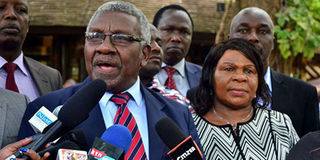What reviewers of CUE rules on lecturer promotions should know

Commission for University Education Chairman Chacha Nyaigotti-Chacha briefs media about their consultative forum, at Safari Park Hotel on February 22, 2019. The agency is mandated to promote quality learning. PHOTO | FILE | NATION MEDIA GROUP
What you need to know:
- It is internationally accepted that, for an academic staff to move to the next level, they must accumulate a number of years of teaching experience.
- The CUE should adopt the international standard of recognising research outputs through web rankings and indices.
There has been an accelerated need to review the Commission for University Education’s rules on promotions of academic staff at institutions of higher learning.
To speed up this process, the CUE tasked a committee to review the criteria and come up with recommendations.
The University Academic Staff Union (Uasu) has been in the forefront agitating for a quick review, making some pronouncements which, if followed, would see every institution have its own promotion criteria for academic staff. But would the institutions set favourable criteria?
There are also fears that this can create a community of academic bootlickers and promotion of emperor worshippers without suitable credentials.
Furthermore, some academic staff would become ‘academic nomads’ who jump across universities with the quest to move to the next grade, creating low-cadre professors at the tail-end who have not gone through the rigours of academics and are, therefore, not fully equipped to mentor even a master’s student.
BEST PRACTICES
As much as the universities are autonomous and should be self-regulating, the CUE should be allowed to perform their duty of ensuring quality, including promotions of academic staff, which has long existed at institutions of higher learning.
The CUE is mandated to help improve this process so that the institutions are uplifted to international standards.
Among the most straightforward variables that have been considered globally are teaching experience, ability to attract research funds, mentorship/supervision of postgraduates and community service.
It is internationally accepted that, for an academic staff to move to the next level, they must accumulate a number of years of teaching experience.
And since the university’s mission is to teach, carry out research and offer community service, the individual must demonstrate the ability to attract research grants and build networks, which, concomitantly, support the training and mentorship of junior academic staff and, hence, benefit society.
RESEARCH IMPACT
One challenge has been in crafting a narrative of scientific research impact.
For example, the CUE provided a formula, which awards more publication points for appearing on scientific publications as a single author as opposed to joint or multiple authors.
In the matrix, the first three authors were more recognised and awarded points generously as opposed to, say, the senior authors in publications with several authors.
The points tended towards zero as the number of authors exceeded 15 in a publication, while senior authorship and corresponding authors were ignored.
It is critical to emphasise that authorship conventions are extremely explicit to the ecologies of particular disciplines.
SPIRIT OF COLLABORATION
For example, in basic sciences, the first author performed the research work and the last provided the mentorship and, in most cases, the funds to perform the work.
It is mostly assumed that the corresponding author is the senior author, irrespective of the position in the publication.
In other disciplines — such as mathematics, economics, business and physics — the authors are listed alphabetically with the recognition of only the senior author.
This presents a complexity in evaluating the actual contributions of authors, especially when CUE attempts to standardise publication points across all disciplines.
Furthermore, the spirit of collaboration is killed since individuals strive to run singly to acquire the highest points.
RESEARCH OUTPUTS
The predatory journals came into force to diminish the pressure to ‘publish or perish’.
This has watered down the quality of research outputs as multiple papers, not subjected to rigorous review, are published in pursuit of promotion.
The CUE should adopt the international standard of recognising research outputs through web rankings and indices as provided for in platforms such as Scopus index, h-index, Google Scholar Citations, ResearchGate and a couple of easily available citation indices for researchers.
A cut-off can then be established for promotion at every level, based on the collective indices generated by the academician across selected platforms.
Prof Ouma teaches in the Department of Biomedical Sciences and Technology, Maseno University. [email protected].




